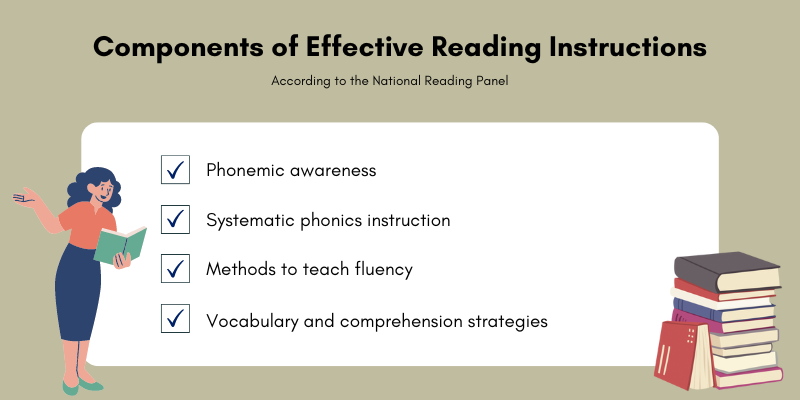What is the Science of Reading?

Young children come to school eager to learn. They want to learn about their world, how to add and subtract, and of course how to read! Teachers who have been lucky enough to work with students as they are learning to read know how exciting it is when they “crack the code” and begin to read on their own. However, inevitably some children struggle with becoming readers and teachers struggle with the best way to teach them. Sometimes it seems like there are more questions than clear answers.
- Do readers need more phonics or more time just reading?
- Should teachers use balanced literacy or skill and drill?
- What should small group instruction look like?
- What kinds of materials should children have? Decodable books? Leveled books? Worksheets?
- Should reading instruction be the same for every child or do certain readers need something different?
While the science of reading is not the single answer for making sure all students become able readers, it does have an important role to play in terms of closing the gap.
The science of reading means that reading instruction is based on what has been scientifically proven to work. Reading expert Timothy Shanahan claims, “one thing everyone who praises the science of reading agrees upon is that instruction should be based on it; that teaching in ways that accord with science will provide students the greatest opportunity to learn” (Shanahan, 2020). In other words, reading instruction, tools, and materials should be based on research with clear supporting evidence (Gabriel, 2020).
The National Reading Panel found in 2020 that effective reading instruction must include the following components.

Although these findings are from over twenty years ago, they still hold true today, provided the components are taught according to the most up-to-date research-based practices (Gibbons, 2020). In fact, these five key components are the backbone of the science of reading framework.
Phonemic Awareness
Phonemic awareness is the ability to identify and manipulate individual sounds (phonemes) in spoken words. A phoneme is the smallest unit of sound in spoken language. The word man, for instance, has three phonemes: /m/ /a/ /n/. By changing just one phoneme (e.g., the /m/ to a /t/), the meaning of the word changes entirely. Phonemes are not letters; they are the sounds that letters represent. There are approximately 44 phonemes in the English language. A student’s phonemic awareness skills have been found to be a good predictor of later reading success or difficulty (Reading Rockets, 2023a).
Phonics
The goal of phonics instruction is to help students learn the idea that letters represent the sounds of spoken language. Ultimately, the goal is to help students understand that there is an organized, logical, and predictable relationship between written letters and spoken sounds. This is sometimes referred to as “sounding out” a printed word (Reading Rockets, 2023b).
Fluency
The three elements of fluency are prosody, accuracy, and rate. Students who exhibit quality fluency move through text without stumbling, pausing unnaturally, and they clearly enunciate.

Vocabulary
While it is true that some students will be able to infer the meaning using contextual clues, there are some words which need to be directly decoded in order to positively impact the comprehension of the text. One technique which has shown favorable results is to identify the words (some call these power words) of a text before students read the text. Then, use the words and their student-friendly definitions to create a word wall in the classroom.
Comprehension
Comprehension is the reason for reading. We read to make meaning. If a student reads the words but has no comprehension of what was read, s/he is not really reading. Since deriving meaning from text is the goal of reading, it is no wonder that comprehension is a key component of the “Big Five.”
The above concepts form the foundation of the science of reading, and the application of this knowledge in the classroom has the aim to ensure that all students learn to read. The background knowledge and overview of science of reading is a good starting point for developing a deeper understanding of how we, as teachers, can apply the research to help our students develop and strengthen their reading skills.
To learn more about the science of reading, visit the Professional Development Institute (PDI) website or go directly to our Science of Reading course. PDI has been offering quality online professional development courses to K-12 educators for over 27 years and provided training to over 345,000 teachers across the globe. We specialize in offering quality, affordable university-approved online courses that focus on the most relevant topics in education while providing practical strategies that can be implemented in the classroom immediately. All PDI courses are at the graduate-level, instructor-led, and are conducted entirely online. University credit is available through University of California Division of Extended Studies. PDI offers an extensive catalog of online courses for teachers on topics that are the most critical in today’s classrooms.
References
Gabriel, R. (2020). “The Future of the Science of Reading.” In The Reading Teacher, 74(1), pp. 11–18.
Gibbons, K. (2020). “Literacy as a Social Justice Issue.” In Putting the Science of Reading Into Practice. Retrieved 15 Jan. 2022 from https://www.illuminateed.com/download/putting-the-science-of-reading-into-practice/
Reading Rockets. (2023a). “Phonological and Phonemic Awareness.” Retrieved 03 May 2023 from https://www.readingrockets.org/teaching/reading-basics/phonemic
Reading Rockets. (2023b). “Phonics and Decoding.” Retrieved 03 May 2023 and 06 June 2023 from https://www.readingrockets.org/teaching/reading-basics/phonics
Shanahan, T. (2020a). “The Science of Reading: Making Sense of Research.” In The Reading Teacher, 74(2), pp. 119–125.
Categories: science of reading, teaching strategies

View PDI's Catalog of Courses
Check out a list of all PDI graduate-level online courses or sort by grade level or subject area.

Register Now!
Quick access to register for PDI's online courses using our secure system.

Learn More about PDI
Find out how to reach PDI and get answers to any questions you may have.
